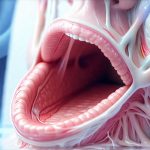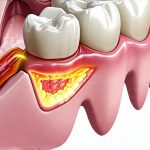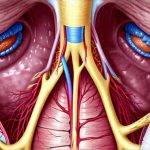Gastroesophageal reflux disease (GERD) is a surprisingly common condition affecting millions worldwide. Many people associate GERD primarily with heartburn and indigestion – and rightly so, as these are hallmark symptoms. However, the reach of GERD extends far beyond digestive discomfort. Increasingly, individuals are reporting seemingly unrelated symptoms like sinus pressure, facial pain, chronic cough, and even dental erosion, prompting questions about a connection between stomach acid and areas seemingly distant from the gastrointestinal tract. Understanding this connection is crucial for accurate diagnosis and effective management, as treating only the visible symptoms often fails to address the underlying cause.
The reason for these wider-ranging effects lies in the complex interplay between our digestive system and other bodily functions. Stomach acid isn’t meant to travel upwards into the esophagus and beyond; when it does, it can trigger a cascade of inflammatory responses throughout the body. The vagus nerve – often called the “wandering nerve” due to its extensive reach – plays a central role here, acting as a communication highway between the gut and various organs, including the sinuses. Furthermore, acid reflux can affect immune function and contribute to systemic inflammation, further exacerbating symptoms in distant areas of the body. This article will explore the relationship between GERD and sinus pressure, shedding light on the mechanisms involved, potential treatment approaches, and when it’s important to seek medical attention.
The Gut-Sinus Connection: How GERD Can Lead to Sinus Problems
The link between GERD and sinus issues isn’t as straightforward as one might assume. It’s not simply a matter of acid directly splashing into the sinuses (although that can happen in rare cases). Instead, it’s often an indirect relationship driven by inflammation and immune response. When stomach acid frequently refluxes into the esophagus, even without noticeable heartburn, it can initiate a systemic inflammatory process. This chronic inflammation doesn’t remain confined to the digestive tract; it spreads throughout the body via the bloodstream, potentially impacting various organs and systems.
The sinuses are particularly vulnerable to this inflammatory cascade. The lining of the sinuses is delicate and sensitive. Chronic inflammation from GERD can lead to swelling of the sinus tissues, causing a feeling of pressure, congestion, and even chronic sinusitis. This explains why some individuals experience persistent “sinus problems” that don’t respond well to traditional sinus treatments like decongestants or antibiotics. The underlying cause isn’t necessarily a bacterial infection; it’s often reflux-related inflammation. It is important to remember that correlation does not equal causation, and other factors can certainly contribute to sinusitis, but GERD should be considered as a potential underlying factor in chronic or recurring cases.
Furthermore, the vagus nerve plays a critical role. This nerve innervates both the stomach and the sinuses (among many other areas). Acid reflux can stimulate the vagus nerve, leading to increased mucus production in the sinuses – further contributing to congestion and pressure. In some individuals, acid reflux can also trigger mast cell activation, releasing histamine and other inflammatory mediators that exacerbate sinus symptoms. This complex interplay explains why GERD-related sinus issues often present with a range of symptoms beyond just pressure, including nasal congestion, postnasal drip, facial pain, and even headaches. Understanding the connection between liver health and immunity can also provide insights into these systemic effects.
Diagnosing Reflux Sinusitis: What to Look For
Identifying reflux sinusitis can be challenging because the symptoms overlap significantly with other sinus conditions. A thorough medical evaluation is crucial for accurate diagnosis. Here’s what doctors typically look for:
- History of GERD: A history of heartburn, acid indigestion, or regurgitation strongly suggests a potential link between your sinus problems and reflux. However, it’s important to note that many people with reflux experience “silent reflux” – meaning they don’t have typical heartburn symptoms but still experience acid traveling up the esophagus.
- Sinus Symptoms Worsened by Food: Pay attention to whether your sinus pressure or congestion worsens after eating certain foods, particularly those known to trigger GERD (e.g., fatty foods, spicy foods, caffeine, alcohol). Symptoms flaring at night are also a red flag, as lying down can exacerbate reflux.
- Lack of Response to Traditional Treatments: If your sinus symptoms don’t improve with standard treatments like antibiotics, decongestants, or nasal corticosteroids, it’s time to consider GERD as a possible underlying cause.
- Diagnostic Testing: Doctors may recommend several tests to assess for GERD and its impact on the sinuses:
- Esophageal pH Monitoring: This test measures the amount of acid in your esophagus over 24 hours. It is considered the gold standard for diagnosing GERD.
- Endoscopy: A small camera is used to visualize the esophagus and stomach, looking for signs of inflammation or damage caused by reflux.
- Laryngopharyngeal Reflux (LPR) Evaluation: LPR is a type of reflux where acid reaches higher up into the throat; an ENT specialist can assess for signs of LPR during an examination. Understanding the connection between pancreas and liver may be relevant in complex cases.
Treatment Strategies: Addressing Both GERD and Sinus Symptoms
Treating reflux sinusitis requires a multi-faceted approach that targets both the underlying GERD and manages sinus symptoms. Simply addressing the sinus congestion without tackling the root cause – the acid reflux – will likely result in temporary relief, if any at all. Here are some key treatment strategies:
- Lifestyle Modifications: These form the cornerstone of GERD management:
- Elevate the head of your bed by 6-8 inches.
- Avoid eating large meals before bedtime.
- Limit trigger foods (fatty, spicy, acidic, caffeinated beverages, alcohol).
- Lose weight if you are overweight or obese.
- Quit smoking.
- Medications: Your doctor may recommend one or more of the following medications:
- Antacids: Provide temporary relief from heartburn but don’t address the underlying cause.
- H2 Blockers: Reduce acid production in the stomach.
- Proton Pump Inhibitors (PPIs): More potent than H2 blockers, effectively blocking acid production. Long-term PPI use should be discussed with your doctor due to potential side effects.
- Sinus Symptom Management: While addressing GERD is paramount, managing sinus symptoms can provide immediate relief:
- Nasal Irrigation: Using a saline nasal rinse (neti pot or squeeze bottle) helps clear congestion and moisturizes the sinuses.
- Steam Inhalation: Can help loosen mucus and ease breathing.
- Allergy Management: If allergies are contributing to sinus issues, appropriate allergy treatment is important.
The Role of Dietary Changes and Gut Health
Beyond simply avoiding trigger foods, a holistic approach to diet and gut health can significantly impact GERD and subsequent sinus pressure. A growing body of research highlights the importance of the microbiome – the trillions of bacteria that live in our gut – in overall health and inflammation. An imbalanced gut microbiome (dysbiosis) can contribute to increased intestinal permeability (“leaky gut”), allowing inflammatory substances to enter the bloodstream and exacerbate systemic inflammation.
- Focus on Anti-Inflammatory Foods: Incorporating foods rich in antioxidants and anti-inflammatory compounds, such as fruits, vegetables, fatty fish (salmon, tuna), and olive oil, can help reduce overall inflammation.
- Probiotic-Rich Foods: Fermented foods like yogurt, kefir, sauerkraut, and kimchi contain beneficial bacteria that can improve gut health. Consider a probiotic supplement after discussing with your doctor.
- Prebiotic Foods: These provide food for the good bacteria in your gut. Examples include onions, garlic, bananas, asparagus, and oats.
- Fiber Intake: Adequate fiber intake promotes healthy digestion and supports a balanced microbiome.
Additionally, identifying food sensitivities can be crucial. While not necessarily allergies, sensitivities to certain foods (e.g., dairy, gluten) can trigger inflammation and exacerbate GERD symptoms. An elimination diet – removing potential trigger foods for a period of time and then reintroducing them one at a time – can help identify these sensitivities. Remember, dietary changes should ideally be guided by a healthcare professional or registered dietitian to ensure nutritional adequacy. Addressing gut health isn’t a quick fix, but it’s an integral part of long-term GERD management and reducing the risk of associated symptoms like sinus pressure. Understanding the livers role in detox is also important for overall wellness. Many experience relief when considering the connection between liver and hormones. Furthermore, exploring how liver health and immunity are linked can offer valuable insights. It’s beneficial to understand the link between liver health and PMS symptoms as well. Finally, if you notice a relationship between your reflux and skin conditions, it’s worth investigating.


















